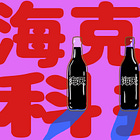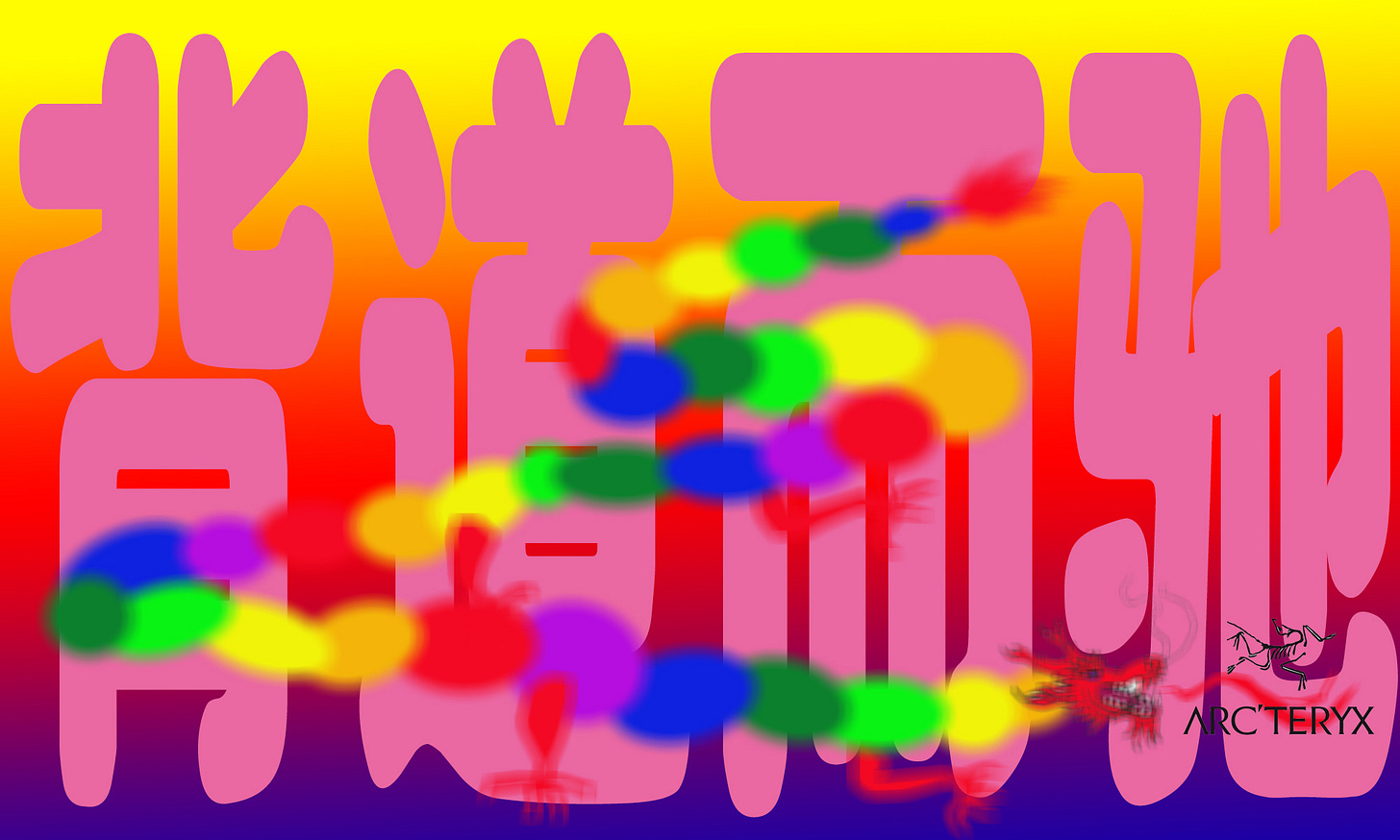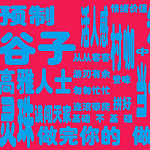Welcome to RealTime Mandarin, a free weekly newsletter that helps you improve your Mandarin in 10 minutes a week.
Subscribe today to get your fluency back, stay informed about China, and communicate with confidence in Chinese — all through immersion in real news.
Arc’teryx (始祖鸟) is a popular outdoor apparel brand in China.
Originally founded in Canada in 1989, its parent company Amer Sports was acquired for $5.2 billion in 2019 by a consortium led by Chinese sportswear company Anta (安踏).
At that time Arc’teryx was unknown in China. But after it became part of Anta it expanded rapidly there with new stores opening 40% faster than in North America.
China is now Arc’teryx’s biggest and fastest-growing market.
So much so that for affluent Chinese city-dwellers it’s become known as a “middle-class must-have” item (中产标配), and a “top outdoor influencer” brand (户外顶流).
But that success might be falling apart thanks to a recent publicity stunt gone badly wrong.
On September 21, Arc’teryx sponsored a huge high-altitude fireworks display in Shigatse (日喀则) in Tibet.
There were four separate displays of long sequences of fireworks set off on remote hillsides with the theme of “Ascending Dragon” (升龙).
The displays were designed by Cai Guoqiang (蔡国强) — a famous fireworks artist best known for creating the pyrotechnic shows at the opening and closing ceremonies of the 2008 Beijing Olympics.
The Arc’teryx-sponsored shows were broadcast on social media.
One video is proudly narrated by Cai Guoqiang who speaks emotionally of how he created the spectacle, and what it represented. He even thanks the “very clever little animals for their help” (感谢聪明的动物们帮助)!
But, unbeknownst to him, his creative work quickly drew strong criticism online.
Environmentalists, climate activists, and customers expressed shock at how Art’teryx was “blowing up a mountain” (炸山) — inflicting damage on the fragile Himalayan ecosystem.
The irony did’t go unnoticed either: Arc’teryx is a brand that champions “revering nature, low-key exploration, and respecting the wilderness”, and of course “leaving no trace” (无痕山林).
On becoming aware of the backlash, Arc’teryx’s first reaction was to delete videos, and offer boilerplate responses to media enquiries, saying:
“The original intention has always been to pay tribute to nature, culture, and the environment.”
始祖鸟的初心始终致敬自然、致敬文化、致敬环境。
They also said that the fireworks used were decomposable and environmentally friendly. Salt bricks (盐砖) were used to “guide small animals to leave the area and move to safety”, and all waste would be cleared immediately after.
But that just led to further criticism.
Especially as images later emerged that huge amounts of waste and exploded fireworks were just left at the site for locals to clear up.
Related
In response to the online uproar, the Shigatse authorities issued a statement confirming a team had been established to investigate. And Arc’teryx then published an apology letter via its social media channels on the same day.
That made things even worse because the wording of apology letters in Chinese and English were different.
In Chinese:
“In evaluating the boundaries of artistic expression, we need to be more professional, and more humble toward nature.
We commit to cooperating with teams to review the project’s ecological impact under government supervision, inviting third-party assessments and implementing remedial measures based on the results.”
在对艺术表达边界评估要更专业、对自然要更谦卑,承诺在政府监管下,配合团队复核项目生态影响,邀第三方评估并依结果补救。
Whereas in English the brand was much more direct:
“This event is in direct opposition our commitment to outdoor spaces, our brand positioning, and the role we hope to play in the community….
We are deeply disappointed this has happened and apologise, full stop.
We’re addressing this directly with the local artist involved, our team in China, and will change the way we work to ensure this doesn’t happen again.”
“这一活动与我们对户外空间的承诺、品牌定位,以及希望为社区扮演的角色背道而驰。我们对此深感遗憾,并在此郑重致歉…
我们正与涉事的当地艺术家及中国团队直接沟通处理此事,并将调整工作流程以确保不再发生类似事件。”
For the Chinese audience, that difference in messaging was a problem.
The overriding opinion in China of the Chinese language apology was “it’s not sincere enough” (不够诚恳), whereas at least in English, the brand had taken full responsibility for its mistakes.
This was interpreted as Arc’Teryx having “double standards” (双标), “throwing the pot” (甩锅) — or trying to lay the blame elsewhere, and, even worse, “treating China differently” (内外有别).
For a brand in China this is an existential error of judgement, as we have seen with other consumer scandals where Chinese consumers feel they are being treated differently (and worse) than buyers of the same brands internationally.
Until recently Arc’teryx had been a success story in China.
As a foreign brand acquired by a Chinese company, it’s built a hugely successful business through effective marketing, branding and positioning.
But that marketing magic might end up being a double-edged sword, as one industry expert notes with a beautifully brief, classical-sounding eight-character phrase:
“Marketing can bring their success, and it can also bring their downfall.”
成也营销,败也营销。
As the online condemnation and disgust towards Arc’teryx continues to simmer, its reputation in China has plummeted with many netizens saying:
“I’m not buying again!”
不再买!
And who can blame them!
So that’s what we’re discussing this week!
Favourite Five
1. 双标 shuāng biāo
double standards
始祖鸟海内外道歉信被指“双标” - Arc’teryx was accused of being double-standard for issuing two different apology letters at home and abroad. [4]
2. 炸裂 zhà liè
explode, mind-blowing, overwhelming
一个标榜户外精神的户外品牌,在最脆弱的生态环境里,搞了一场炸裂的烟花秀 - An outdoor brand that claims to embody the spirit of nature put on a “spectacular” fireworks show in one of the most fragile ecosystems. [1]
3. 博眼球 bó yǎn qiú
seek attention, grab eyeballs
这一回,却在营销端选择“炸山”博眼球 - This time, they chose to “blow up the mountain” as their marketing strategy just to grab attention. [2]
4. 内外有别 nèi wài yǒu bié
different at home and abroad, double standard
部分网友质疑,始祖鸟的致歉“不够诚恳”“内外有别” - Some netizens questioned whether Arc’teryx’s apology was sincere enough and accused the brand of being double-standard. [4]
5. 背道而驰 bèi dào ér chí
run counter to, go against
这一活动与我们对户外空间的承诺、品牌定位,以及希望为社区扮演的角色背道而驰 - This event runs counter to our commitment to outdoor spaces, our brand positioning, and the role we hope to play in the community.
🎧RTM Podcast Preview
This week on the RTM Advanced podcast, we go deep into phrases annoyed consumers are using to have a go at Arc’teryx:
“Treating China differently” (内外有别) — a Lu Xun classic
“Double standards” (双标) — used a lot in political statements
“Throwing the pot” (甩锅) — a common internet slang phrase
Tune in at 7 minutes where we break down what they mean, how native speakers use them, and how you can use them in real conversations.
Consuming the Conversation
In every RTM Advanced post you unlock content and tools to inspire you, and help you get fluent.
This week we teach you essential phrases to discuss this story.
So, ready to finally get started and wave good bye to that nagging rusty feeling?
Let’s jump in👇
Useful words
6. 背叛 bèi pàn
betrayal, to betray
搞了一场炸裂的烟花秀,这是不是对自然的一场巨大背叛? - By staging this “spectacular” fireworks show, the brand has shown a reckless disregard for nature. [1]
7. 套话 tào huà
cliché, empty words
先是删除了相关视频和宣传内容,回应也充满套话 - After deleting the videos and promotional content, they responded with little more than empty rhetoric. [1]
8. 甩锅 shuǎi guō
shift blame, pass the buck
文中提到的“与中国团队沟通调整工作方式”有“甩锅”的嫌疑 - The reference to “communicating with the Chinese team to adjust working methods” in the statement seems to shift blame. [1]
9. 苍白 cāng bái
pale, weak
这个时候,披露更多事实与采取行动比苍白的回应更重要 - At this juncture, disclosing more information and taking concrete action matter more than issuing an empty statement. [1]
10. 洗绿 xǐ lǜ
greenwashing
始祖鸟此次翻车,正是“洗绿”营销的典型案例 - Arc’teryx’s recent fiasco is a textbook example of “greenwashing” in marketing. [3]
11. 砸钱 zá qián
spend money recklessly, throw money at
说白了,这就是一场资本砸钱换流量的游戏 - At its core, it’s just a cash-for-visibility game. [5]
12. 遭殃 zāo yāng
suffer, be harmed
至于山会不会受伤,环境会不会遭殃,他们好像没太放在心上 - As for whether the mountain would suffer and the environment would be damaged, they didn’t seem to care much. [5]
13. 撑腰 chēng yāo
back up, support
凭什么?就因为他有名气,有资本撑腰? - Why? Just because he is famous and backed by the Anta group? [5]
Three-character phrases
14. 不买账 bù mǎi zhàng
not buying it, not be convinced

















